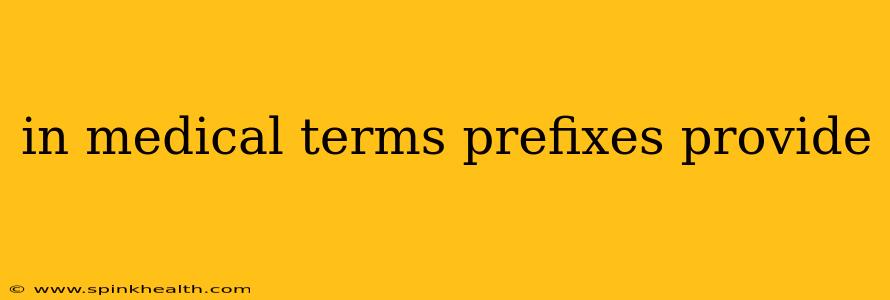In Medical Terms, Prefixes Provide: A Deep Dive into Medical Terminology
Medical terminology can seem like a foreign language, a complex tapestry woven from Greek and Latin roots. But understanding the building blocks of these terms—prefixes, suffixes, and root words—unlocks the meaning and allows you to decipher even the most daunting medical jargon. Today, we'll focus on prefixes, those crucial elements placed at the beginning of a word that significantly modify its meaning. Let's embark on a journey into the world of medical prefixes, exploring their function and significance in the medical field.
Imagine yourself as a medical detective, piecing together clues to diagnose a patient. Each medical term is a cryptic message, and the prefix is often the first, vital clue. Knowing the meaning of common prefixes dramatically enhances your understanding of medical diagnoses, procedures, and conditions.
What exactly do prefixes provide in medical terms?
In essence, prefixes provide additional meaning to the root word, often indicating location, number, size, or time. They act as modifiers, adding specificity and precision to the overall term. Without prefixes, medical terms would often be vague and ambiguous.
For example, consider the word "hypertension." The prefix "hyper-" means excessive or above normal. Combined with the root word "tension," we understand hypertension to mean abnormally high blood pressure. Without "hyper-," the term "tension" is far less informative.
What are some common medical prefixes and their meanings?
Let's delve into some frequently encountered medical prefixes:
- a-, an-: Without, lack of, or absence of. Examples: anemia (lack of blood), aphasia (loss of speech).
- anti-: Against, opposing. Example: antibiotic (against bacteria).
- brady-: Slow. Example: bradycardia (slow heart rate).
- dys-: Difficult, painful, or abnormal. Example: dyspnea (difficult breathing).
- endo-: Within, inner. Example: endoscope (instrument for viewing inside the body).
- epi-: Upon, on, or above. Example: epidermis (outer layer of skin).
- exo-: Outside, outward. Example: exogenous (originating outside the body).
- hemi-: Half. Example: hemiplegia (paralysis of one side of the body).
- hyper-: Excessive, above normal. Example: hypertension (high blood pressure).
- hypo-: Under, below, deficient. Example: hypoglycemia (low blood sugar).
- inter-: Between. Example: intercostal (between the ribs).
- intra-: Within, inside. Example: intravenous (within a vein).
- peri-: Around, surrounding. Example: pericarditis (inflammation of the sac surrounding the heart).
- poly-: Many, much. Example: polycythemia (excess of red blood cells).
- pre-: Before, in front of. Example: preoperative (before surgery).
- pro-: Before, in front of; also, favoring, supporting. Example: prognosis (prediction of outcome).
- sub-: Under, below. Example: subcutaneous (beneath the skin).
- supra-: Above, upon. Example: suprapubic (above the pubic bone).
- tachy-: Rapid, fast. Example: tachycardia (rapid heart rate).
- trans-: Across, through. Example: transdermal (through the skin).
How do prefixes help me understand complex medical terms?
Understanding prefixes is like having a decoder ring for medical jargon. They provide essential context, allowing you to quickly grasp the general meaning of a term even if you're unfamiliar with the root word or suffix. For instance, even without knowing the exact meaning of "gastr," you can infer that "gastritis" involves inflammation (indicated by "-itis") of the stomach (implied by "gastr").
Are there different categories of prefixes in medical terminology?
Yes! While the list above highlights the many functional categories prefixes serve, we can also categorize them based on their origin—mainly Greek and Latin. Many prefixes share roots and variations in meaning due to this shared etymological history.
What resources can help me learn more about medical prefixes?
Numerous resources are available to help you expand your knowledge of medical prefixes. Medical dictionaries, online terminology resources, and anatomy and physiology textbooks provide extensive lists and explanations of prefixes, suffixes, and root words. Interactive learning tools and flashcards can also aid in memorization and comprehension.
By understanding medical prefixes, you become a more informed and engaged patient, healthcare professional, or medical student. You gain a valuable skill in deciphering complex medical terms, leading to improved communication, comprehension, and ultimately, better healthcare.

